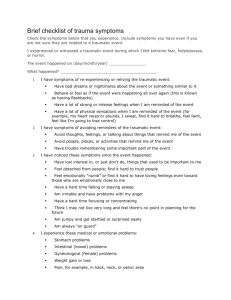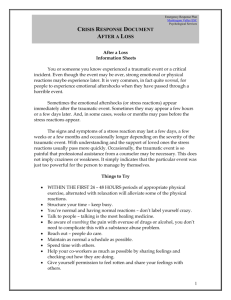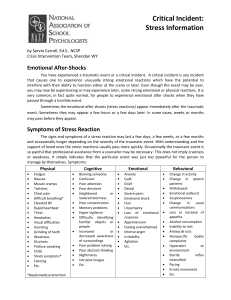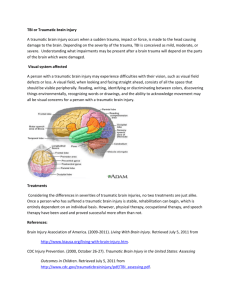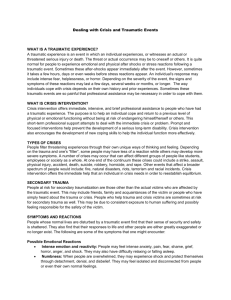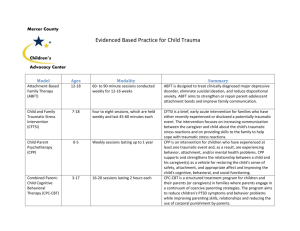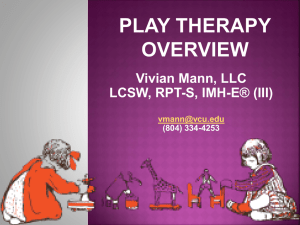TBI in Older Adults
advertisement
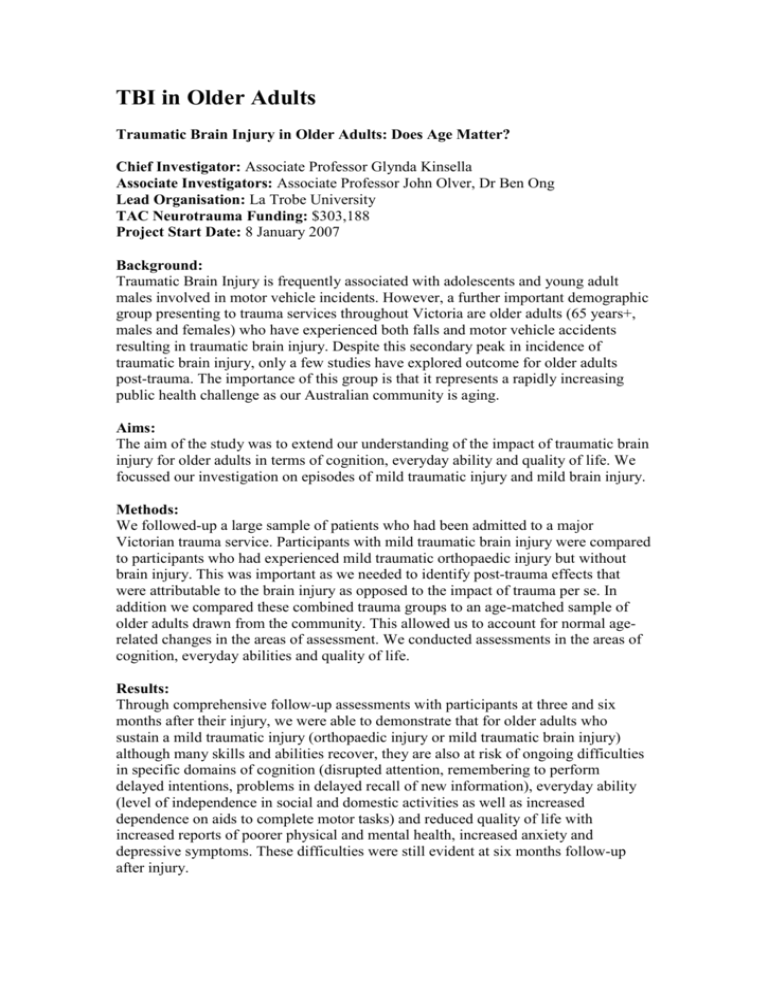
TBI in Older Adults Traumatic Brain Injury in Older Adults: Does Age Matter? Chief Investigator: Associate Professor Glynda Kinsella Associate Investigators: Associate Professor John Olver, Dr Ben Ong Lead Organisation: La Trobe University TAC Neurotrauma Funding: $303,188 Project Start Date: 8 January 2007 Background: Traumatic Brain Injury is frequently associated with adolescents and young adult males involved in motor vehicle incidents. However, a further important demographic group presenting to trauma services throughout Victoria are older adults (65 years+, males and females) who have experienced both falls and motor vehicle accidents resulting in traumatic brain injury. Despite this secondary peak in incidence of traumatic brain injury, only a few studies have explored outcome for older adults post-trauma. The importance of this group is that it represents a rapidly increasing public health challenge as our Australian community is aging. Aims: The aim of the study was to extend our understanding of the impact of traumatic brain injury for older adults in terms of cognition, everyday ability and quality of life. We focussed our investigation on episodes of mild traumatic injury and mild brain injury. Methods: We followed-up a large sample of patients who had been admitted to a major Victorian trauma service. Participants with mild traumatic brain injury were compared to participants who had experienced mild traumatic orthopaedic injury but without brain injury. This was important as we needed to identify post-trauma effects that were attributable to the brain injury as opposed to the impact of trauma per se. In addition we compared these combined trauma groups to an age-matched sample of older adults drawn from the community. This allowed us to account for normal agerelated changes in the areas of assessment. We conducted assessments in the areas of cognition, everyday abilities and quality of life. Results: Through comprehensive follow-up assessments with participants at three and six months after their injury, we were able to demonstrate that for older adults who sustain a mild traumatic injury (orthopaedic injury or mild traumatic brain injury) although many skills and abilities recover, they are also at risk of ongoing difficulties in specific domains of cognition (disrupted attention, remembering to perform delayed intentions, problems in delayed recall of new information), everyday ability (level of independence in social and domestic activities as well as increased dependence on aids to complete motor tasks) and reduced quality of life with increased reports of poorer physical and mental health, increased anxiety and depressive symptoms. These difficulties were still evident at six months follow-up after injury. Conclusions: The results of our study will provide information about the specific challenges that older adults can be faced with in recovering from traumatic brain injury and will provide information that can be used to direct intervention to assist resumption of healthy aging or age-appropriate support as needed. Publications: KINSELLA GJ. Everyday memory for everyday tasks: Prospective memory as an outcome measure following TBI in older adults. Brain Impairment. 2010;11:37-41. KINSELLA GJ. What are the characteristics of traumatic brain injury in older adults? Brain Impairment. 2011;12:71-75. Presentations: HUMPHRIES A, KINSELLA G, ONG B, MARCH E. Older Traumatic Brain Injury Patients Display Impaired Phonemic Verbal Fluency at 3-months Post-injury. Trauma Melbourne; 2008 November 2122, Melbourne, Australia. HAMMERSLEY E, KINSELLA G, ONG B, MARCH E. Remembering to carry out intentions following traumatic brain injury in older adults. Trauma Melbourne; 2008 November 21-22, Melbourne, Australia. POTTER B, KINSELLA GJ, ONG B, OLVER J, KOSSMANN T. Neuropsychological outcome and recovery from mild TBI in older adults. 31st Brain Impairment Conference; 2008 May 1-3, Melbourne, Australia. MARCH E, KINSELLA G, ONG B, OLVER J. Three-month cognitive outcome in older adults with traumatic brain injury. Trauma Melbourne; 2008 November 21-22, Melbourne, Australia. KINSELLA G. Traumatic Brain Injury and Older Adults. Invited lecture at the 31st Brain Impairment Conference; 2008 May 1-3, Melbourne, Australia. KINSELLA GJ, ONG B, OLVER J, MARCH E. Traumatic Brain Injury in Older Adults: Cognitive Consequences. 19th World Congress of Gerontology and Geriatrics; 2009 July 6-9, Paris, France. KINSELLA GJ, ONG B, OLVER J, PRICE S. Cognitive consequences following mild traumatic brain injury in older adults. Trauma Melbourne; 2009 November 20-21, Melbourne, Australia. OLVER J. The Influences of Age on Outcome following Traumatic Brain Injury. 5th World Congress of the International Society of Physical and Rehabilitation Medicine; 2009 July 13-17, Istanbul, Turkey. KINSELLA GJ. Everyday memory for everyday tasks: Prospective memory following traumatic brain injury in older adults. Presidential address at the 32nd Brain Impairment Conference; 2009 May 1-3, Sydney, Australia.
